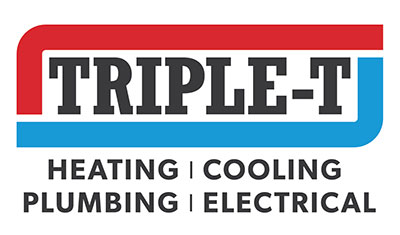9 Warning Signs of a Faulty Air Conditioner
Summer may be drawing to a close, but you still need your air conditioner to get you through the end of the season. Are you starting to notice strange behavior from your AC unit? Cooling equipment commonly acts up before it breaks down, so watch for these nine warning signs of a faulty air conditioner. Troubleshoot the problems if you can, or call Triple T Heating, Cooling & Plumbing for more help.
1. No Airflow
Does your air conditioner refuse to turn on? First, make sure the thermostat is set to “cool” and turn down the temperature a few degrees. If these adjustments don’t make a difference, check the electrical panel and reset any tripped circuit breakers you find. If you determine that the unit is receiving power but still won’t turn on, schedule AC repair without delay.
2. Weak Airflow
If the air flowing from your vents has gradually gotten weaker, the air filter may be clogged. If replacing it doesn’t help, leaky or collapsed ductwork could be to blame. Schedule AC services for help uncovering what’s wrong.
3. Hot Airflow
Perhaps the airflow is strong but not cold. Check the thermostat first. If the fan is set to “on,” it will blow constantly, even when the compressor isn’t running. To remedy this, change the fan setting to “auto.”
If the problem persists, examine the outdoor unit for foliage or other obstructions that could be impacting heat transfer. Trim back encroaching branches and spray down the unit to remove insulating dirt and debris.
If these AC troubleshooting tips don’t work, you likely have a refrigerant leak. Only a qualified professional can detect and repair this problem.
4. Constant Operation
Your air conditioner should cycle on, run for several minutes, and shut off again. If it runs constantly, first try changing the fan from “on” to “auto” so it only blows when the compressor is running. If you feel like the AC is struggling to keep your home cool, the system may be undersized or have a refrigerant leak.
5. Unusual Noises
It’s never good to hear unusual noises coming from your air conditioner. Here are some of the most common AC sounds and what they mean:
- Banging or clanking indicates that an internal mount, connecting rod, piston pin, or other part is loose inside the compressor. Since this is a sealed unit, replacing the compressor is your only option.
- Hissing warns you of a catastrophic refrigerant leak that needs immediate professional attention.
- Bubbling is more common than hissing. It points to a slow refrigerant leak that needs detection and repair as soon as possible.
- Buzzing indicates a potentially serious electrical problem requiring prompt attention.
- Rattling or clanking might mean the motor mounts have failed.
- Clicking and ticking at startup points to loose hardware that has gotten inside the compressor.
- Screaming is a warning sign that the high-pressure sensor is malfunctioning. Turn off the unit immediately and call an HVAC professional for help.
- Squealing should be brief and not last beyond startup. If your air conditioner never used to squeal but has recently started making this noise, it may need a repair.
6. Odd Smells
To avoid risking your family’s health and safety, watch out for these air conditioner smells:
- A musty odor means mold, mildew, or fungus is growing in or around the air conditioner. First, try replacing the air filter. If the smell lingers, hire a professional to clean your air conditioner.
- A rotten egg smell could indicate a natural gas leak somewhere near your ductwork. If you can’t pinpoint where it’s coming from, evacuate your home and call your utility provider.
- A sewage stench may emanate from a backed-up sewer line or ruptured sewer vent pipe near the duct system. Contact an HVAC technician without delay to investigate the problem.
- A stinky feet smell may stem from stagnant water that has collected in the AC system rather than draining away. A thorough cleaning should remedy the problem.
- An electrical burning odor could point to a shorted-out circuit board or fan motor. A professional can examine your system and recommend which parts to replace, if necessary.
7. Pooling Water
The floor around your HVAC system should remain dry. If it’s damp, check the condensate pan first. This may overflow if algae or other obstructions block the drain line. If that’s not the problem, examine the evaporator coil for ice buildup. Low refrigerant may cause moisture in the air to freeze on the coil, dripping water onto the ground as the ice slowly melts. Each of these potential causes demands professional HVAC service.
8. Rising Electricity Bills
It’s normal for energy costs to fluctuate from month to month. Rising electricity rates may also contribute to higher bills over time. But if your energy usage increases with no apparent cause, it could mean your air conditioner is working harder than usual. Schedule AC repair to diagnose and remedy the problem so you don’t overpay any longer than necessary.
9. Temperature Imbalances
Hot and cold spots could signal that your HVAC system is out of balance. First, check that all your return and supply air vents are open and unblocked by furniture, rugs, or curtains. If the temperature imbalances continue, your AC may be functioning inefficiently, or your air distribution system may be poorly designed. Speak with a heating and cooling technician for advice on how to fix the problem.
Contact Triple T If You See These Warning Signs
At Triple T Heating, Cooling & Plumbing, we are dedicated to keeping our customers cool and comfortable all summer long. If your air conditioner is acting up, don’t wait for the system to break down completely. Instead, call us for reliable AC repair. We’ll restore your air conditioner to proper working order, with same-day emergency services to keep you from waiting.
Reach out to us at 801-798-7711 if you live in Utah County or 435-275-4011 if you’re a Washington County resident. You can also schedule HVAC services online.


